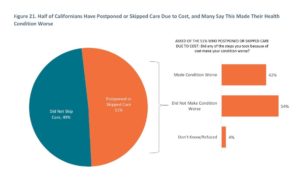The California Health Care Foundation has released a new poll showing that Californians are increasingly worried about the rising cost of health care, and want the state to take action. The poll, which surveyed a representative sample of Californians, also found that over half of Californians have postponed or skipped care due to cost. Results from the survey are also compared to a 2019 CHCF poll on the same topics to identify emerging trends.

Specifically, more than eight in 10 or 84% Californians think addressing health care affordability should be an extremely or very important priority for the Governor and Legislature in 2020. Just over half of Californians or 51% skipped or postponed physical or mental health care due to cost. Of those who took this step, 42% said it made their condition worse. Compared to last year’s survey, Californians are more worried about paying for unexpected medical bills , out-of-pocket health care costs, prescription drugs, and health insurance premiums.
Many Californians also reported going to great lengths to be able to pay their medical bills: Two-thirds have cut back on spending on basic household items like food and clothing. Almost half have used up their savings, increased their credit card debt ), taken on extra work, borrowed money from friends or family, or taken out money from their long-term savings accounts such as savings for college or retirement.
Many Californians are worried about medical bills, and making touch choices to afford their health care, and this poll underscores the urgency of policymakers to take action on health care affordability. Compared to other industrialized countries, Americans pay more for care and get less, with worse outcomes. Health care costs are a major contributor to the affordability crisis in California, and our state leaders need to act to help patients and hold the health industry accountable.
The poll results also highlight the urgency of passing Governor Newsom’s proposal for a new Office of Health Care Affordability. The office would take a comprehensive approach to lowering costs by setting cost targets across the entire health care system, and would build in enforceable financial consequences for parts of the industry that fail to meet these goals. As California consumers are being crushed by the high cost of health care this new Office is the most innovative and potentially effective tool the state would have provide urgent relief to patients and the public. California needs to continue its leadership role in going after specific abuses and market failures, from surprise medical bills to inflated prescription drug prices, and we need an Office of Health Care Affordability to undertake a comprehensive strategy to demand and ensure savings that provides real cost relief to consumers.